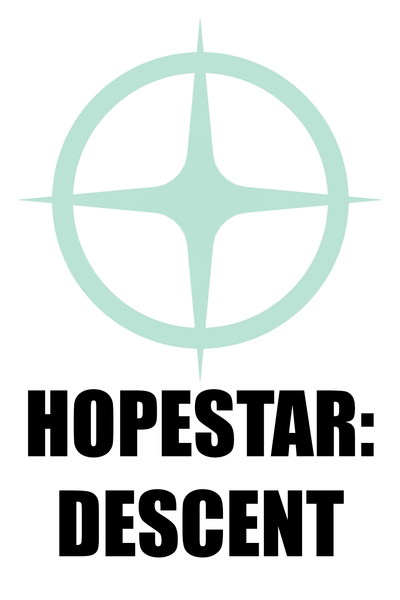She wouldn’t have left the ship in time to catch the light rail if Robert hadn't kicked her out of her seat. Quite literally: he kicked the chair repeatedly until she gave in and closed the work board. Now, Irene was trying to catch her breath in the corner of the last cart of the last tram right before the line went on the daily two-hour-long maintenance. No one paid her much attention.
Hopestar felt like an extension of her body to Irene, so travelling outside of it felt wrong and scary. She wasn’t sure if every part of the transport system was maintained properly, when the last issue report was filed, how severe the bugs were, and who exactly was in charge of driving the trams. And she didn’t have override access for emergencies. Bogota spaceport felt too big, its ceilings too tall, the terminals spread too wide over a thin strip of land, hugged by the mountains on one side and the city itself on the other. It wasn’t the biggest spaceport on Earth or even in Pan-America. (This was exactly why they were landing here and not, say, at Orlando or Singapore: fewer people, less media coverage, and less pressure on the local government agents from the SOI high board.) But it was bigger than the port on Tiktik, or any of the stations outside the SOI. And there were people everywhere, people she knew would shy away from her if she wore any Hopestar branded clothes.
The tram took her to the Local terminal, from where atmospheric shuttles, planes, and choppers moved people around Pan-America and to the different sides of the planet. In Irene’s mind, only shuttles were justified: it was genuinely the fastest and simplest way to get from here to Pan-Asia, Pan-Africa, Pan-Oceania, and the Northern Sector. But travelling across Pan-America could be done by train and was much cheaper and often faster. Yet, people stubbornly took to the skies to flaunt their status, to show that they could afford more than the common citizens living off the universal income. It was laughable. In the rest of the human inhabited space, Earth citizenship was considered the highest privilege that could be achieved in life. And yet, on the planet itself, society was as divided into classes as anywhere else.
Humanity was hopeless, Irene thought.
Local terminal was where Gülnara’s shuttle landed, arriving from her home town in northern Pan-Asia (or was it technically in the Northern Sector?), and, being stamped, she had no permission to leave the terminal without an extended travel authorisation, which she didn’t have. It cost an arm and a leg to get one, and for what? Just to meet with an estranged wife who wasn’t even considered that on this planet? They both agreed it would be illogical, so Irene used her temporary permit as a crew member of a transit spaceship to make this trip and cross the two borders that divided Bogota spaceport into unnecessary sectors.
They were meeting at a small cafe, far enough from the main Departures zone that the owner was desperate for revenue and did not have an ID scan at the door. Irene ordered hot brew and a cucumber sandwich using the stationary interface and took a corner table. (Cucumber was a type of a vegetable, as far as she knew. She had lived on simulated carbs, proteins, and fats for almost two decades now, so she hoped something like a vegetable wouldn’t completely destroy her digestive system. Even before leaving for space, she never had anything more natural than salad sprouts from an orbital greenhouse, and, on one occasion, something spongy called ‘calamari’.) She did not have to order any food but spending money would hopefully endear the owner to her a little bit.
Irene was early so she had to wait for 20 minutes. Her sandwich arrived, and she ate a piece of it; then another; then she sipped some of the brew and realised the cup was not insulated. By the time Gülnara stepped through the entrance, not a minute too soon, she found Irene with some breadcrumbs on a smudged plate and undrinkable cold slush.
“Are you sure this won’t kill you before we have a chance to finish talking?” Gülnara smirked and tapped the rim of the empty plate with her gloved hand. She was tall and wide-shouldered, with a round face and flat nose, her thick space-black hair pulled into two braids. Compared to Irene, she was practically white, but probably not as much as certain groups of people from the Northern Sector were. These seven years aged Gülnara; living planet-side under a constant glare of the sun did that to people. She also turned 50 a few years back, and no matter the skin care routine the years would always leave their mark. Irene herself was nearing this dreaded number - 50 - but had been lucky so far. Or wasn’t too critical of her reflection.
“I missed you.” Irene blurted out without meaning to. The presence of Gülnara here in the arm’s reach pulled these words out of her throat. She was doing fine all these years, went through grief and denial and accepted the situation, even tried to date now and then. But suddenly it all crashed inside her ribcage and into her stomach.
Or was it the sandwich?
Gülnara’s face went stony and she pursed her lips disapprovingly, the way she used to look at the skeins of cables during maintenance. Irene was this annoying maintenance to her.
“Don’t start. We’ve decided everything long ago.”
“Did we? You just left.”
Exasperated sigh. “Yeah, because that’s what I wanted! Not everything has to be beneficial to you.” She obviously regretted saying that and leaned back with a sigh. “Sorry, it’s just… I don’t want to go all drippy about what’s in the past. It’s done, we are over. You should have filed the divorce years ago, because you are the only one who has access to that system.”
Irene stared down at her hands. She tried doing that several times. She would go to Seidel or Kamenev or Zulu, intending to ask them to clear the marital status in her Hopestar file. But then something else would come up, and she wouldn’t find a good way to change the subject and… yeah, it didn’t happen.
“I came here to meet an old friend. Hoping to catch up.” Gülnara’s voice turned softer and a small smile appeared on her face.
“Yeah.” Irene managed a smile too. “From your letters, you always sound so busy.”
“Work never ends.”
Gülnara went on talking about the community she lived in and the lobbying her organisation was doing lately. It was a self-sustaining agricultural commune at the base of the Altay Mountains; they had their own grain fields, algae growing vats, fish breeding and processing plant in the nearby lake, and an old but sturdy industrial printer. It was located on a patch of land allegedly owned by a queer millionaire who had enough money to avoid being stamped and his property being confiscated, but still wanted to support the marginalised community he felt connected to. (Irene didn’t believe this story. The money would be easy to track back to such a person. The real source of investment had to be hidden behind layers of companies. Or it could be tax evasion; she wasn’t sure how, but often the wildest schemes turned out to be that.) There were about five thousand permanent residents, with another thousand coming and going.
Those who were not involved in growing food, producing materials, and maintaining the infrastructure, were focused on policy work and lobbying. The ultimate goal was to reform the current government system and get rid of the red stamps altogether. They were writing proposals, accumulating research articles from across the inhabited space, translating relevant texts from Far-Galactic and Gemi dialects, making connections to government-adjacent open-minded people and organisations, and sending thousands upon thousands of letters.
“I am hoping to meet a local businessman here, at the spaceport, after our meeting. We’ve heard he plays golf with a Bogota Southern Sector Council member. Could be a chance to get an actual government agent on our side.”
“Aren’t these councils only responsible for approving building construction and cleaning the public bins?” Irene said with a little chuckle.
Gülnara didn’t appreciate her tone. “If it makes the lives of even a dozen queer people better - it is worth persuading.”
Irene pressed her fingers together on her chest in an apology. “You are right. It’s just… such a stark difference from you back on Hopestar. Chasing after people, writing manifestos…”
“At least I am doing something useful now.”
There was a pause while Irene wrapped her mind around this comment. “I am Engineer First Class of Hopestar, I am quite use-”
“Yeah-yeah, and what does Hopestar do? For the queer community at large?”
Irene frowned and stared at Gülnara, baffled. What does Hopestar do?...
“Are you serious? We are only the most famous spaceship in modern history, the only one operated by-”
“By a stamped crew, great! So you employ a hundred people, that’s it? While attracting all the clout and acting like this sole beacon of representation!”
“We don’t!” Irene shook her head, the words adding to the sickening feeling in her stomach. “We don’t pretend to represent all of the queer people!”
Gülnara snorted. “And yet, in the SOI, that’s how you are viewed. Every time we try to shed light on an injustice against the stamped that goes against the basic human rights in the Human Constitution, they rebuke us with ‘but you have Hopestar!’. ‘Stamped can’t access interstellar travel freely’ - ‘But you have Hopestar!’. ‘Stamped struggle to find employment on colonies’ - ‘But you have Hopestar!’. ‘No access to data import across the SOI’ - ‘Hopestar!’”
“It’s not our fault!” Irene exclaimed and shook her head in disbelief. “We connect mixed colonies and Gemi space for humans, we are a lifeline for the stamped who want to find a better life outside of SOI! Even unstamped people travel with us, because SOI deemed them disposable!”
“And do you charge those unstamped extra, the way they overcharge us?” Gülnara asked scathingly. “No? How come? ‘We are better than them’? How noble of you.”
“You know full well that we wouldn’t survive in the SOI economy if we only took money from the stamped people! Most of them can’t even afford-” Irene shut up when she realised she stepped into a trap.
Gülnara smiled coldly, grim satisfaction in her eyes. “Can’t afford flying on the spaceship for the stamped, huh? Then are you really a lifeline? Or are you just a fancy cruise ship for the rich?”
Irene stared at her empty plate, a feeling of dread pressing at her ribcage from inside. This was not right. There was surely an argument that would be enough to change her mind, because clearly she was wrong.
“Interstellar travel is expensive, it can’t be helped-”
“Then, perhaps, what the community really needs is not a way to run away!” Gülnara slapped her hand on the table and leaned forward. “They need the society they already live in to be improved! Made accessible to all humans equally, no matter their gender, orientation, or citizenship! Hopestar does nothing to achieve that. We do, I do!”
Heavy silence fell between them. Gülnara crossed her arms on her chest and stared at the empty table nearby. Irene had her fingers locked on her lap, her face burning, her chest hurting. This was unfair, and yet she couldn’t find a worthy rebuke that didn’t sound like an excuse. The cafe host shuffled over and asked if he could take the empty plate. This released the tension, and the two of them started getting up.
“Do file the divorce, will you?” Gülnara said quietly and squeezed Irene’s shoulder. “It will be for the best. I do wish the best for you.” Not getting any response, she added. “And do write letters. I don’t want us to completely lose connection.”
Irene swallowed and nodded, looking up in her face. She was so close, and yet unreachable. Not a woman she married a decade ago, but a completely different person in both appearance and mind. But not an enemy.
“I will… Perhaps, after we upgrade the hovers on Jeph.”
Gülnara grimaced. “Ooff, good luck with that place. Heard shitty things about the political climate there.”
“The more reason for Hopestar to drop by. Even if only to get just a dozen queer people off it.”
Gülnara smirked. “That is fair. Though, you could’ve moved a full thousand if you didn’t focus on the financial side. But let’s not fight about this.”
They parted their ways almost immediately after leaving the cafe. Instead of taking a tram back, Irene chose to go on foot through the observation gallery that offered a breathtaking view of the Bogota city stretching over the horizon. By the time she reached the gate, she could barely move her feet.











Comments (0)
See all